Jim Jarmusch has been one of US cinema’s drollest, driest voices for more than three decades but there are no excerpts from his films during Jim Jarmusch Revisited, an evening of music from his work at the Barbican, London. No dazed Johnny Depp in the trippy western Dead Man, no shock-haired Tilda Swinton in the vampires’ lament Only Lovers Left Alive, no serene Adam Driver as a bus-driving poet in Paterson. For the first three numbers, though, the nine-piece band is concealed by a gossamer-thin curtain on to which images from Jarmusch’s milieu are projected: criss-crossing metal fire escapes, a deck of cards, a day at the track. And smoke. Lots of smoke. (“I’ve smoked so many cigarettes,” he once said. “I am a cigarette. You know?”) This creates the illusion that the music is emanating from inside that footage, which feels exactly right. Jarmusch came to prominence in the early 80s, when movies were first being used as tools to sell soundtrack albums, but his were different. Music wasn’t there to shift units; it lived in the fibres of the celluloid.
The Ohio-born director, who is now 64, was part of the CBGB new-wave scene in the late 70s and he is still in a band today: fuzzy curlicues of electric guitar by his outfit Sqürl dominate Only Lovers Left Alive. From the start, he used musicians as actors and looked to music to provide the animating vitality that he resisted visually. Songs say what his characters cannot. Screamin’ Jay Hawkins’s throat-abrading scorcher I Put a Spell on You blasts from a tinpot cassette player in Stranger Than Paradise, in which the characters scarcely do more than grunt and glare. That film starred the stringbean-thin, cucumber-cool jazz saxophonist John Lurie alongside Richard Edson, the original drummer from Sonic Youth. It made Jarmusch’s reputation in 1984, back when “indie” really did mean “independent” rather than “the boutique arm of a major studio”.
You could assemble a musical supergroup from his casts since then. Lurie and Tom Waits sashayed through New Orleans in Down By Law, with Waits going on to score Night on Earth. Screamin’ Jay Hawkins played a hotel concierge in a spiffy tomato-red suit in Mystery Train; Joe Strummer and the ghost of Elvis also had walk-on parts. Iggy Pop (the subject of Jarmusch’s recent documentary Gimme Danger) showed up as a trapper in a bonnet in Dead Man, and the White Stripes discussed Nikolai Tesla in Coffee and Cigarettes, where RZA and GZA, both of the Wu-Tang Clan, could also be found knocking back the joe with Bill Murray. The RZA also lopes down the street in Ghost Dog: Way of the Samurai, a Jarmusch film he scored.
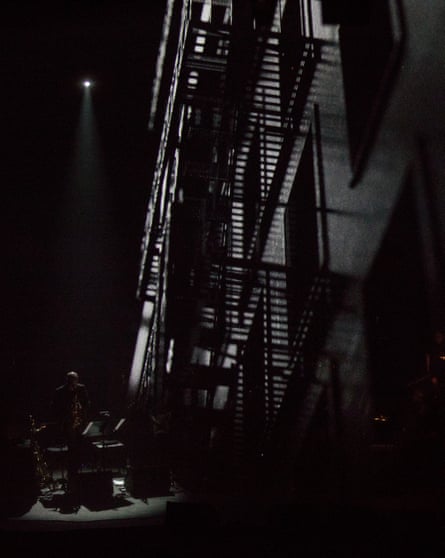
With unassuming casualness, Jarmusch’s soundtracks and cast lists have created a cumulative portrait of the US musical underclass, much of it African American, that reflects his films’ interest in the marginal or overlooked – the drifters, dreamers and beatniks who give that troubled nation its artistic character. His enthusiasms range from blues and jazz to swamp rock, hip-hop and siren songs; almost all of these are represented in the set list for the first of the two Barbican shows, assembled by David Coulter (who was behind a similar 2014 endeavour focusing on David Lynch). The torch singer Camille O’Sullivan brings down the house, or at least the gossamer curtain, with a full-blooded take on I Put a Spell on You, stamping her glittery boots and twirling her black lace shawl like a vampire’s cloak. She returns later for You on the Run (from the obtuse hitman thriller The Limits of Control, Jarmusch’s least likable film), which approaches the squall of the Bad Seeds or Gallon Drunk. It’s no coincidence that Terry Edwards, whose saxophone provides the evening with one of its most piercing through-lines, has served with both.
The Ethio-jazz maestro Mulatu Astatke flies in from Addis Ababa to preside cheerfully over his vibraphone during several of the playful, fruity numbers that Jarmusch included in Broken Flowers. Kirin J Callanan, in stetson and kilt, delivers a scratchy Mystery Train, but the highlight comes from Jolie Holland, on acoustic guitar, and Dave Okumu, on electric, duelling through Neil Young’s frazzled, plangent theme from Dead Man. To my ears, it’s one of the most transformative film scores ever recorded; to the late critic Roger Ebert it resembled “nothing so much as a man repeatedly dropping his guitar”.
Though Jarmusch himself is nowhere to be seen, the Franz Ferdinand frontman Alex Kapranos is a passable lookalike since dyeing his hair vanilla-white. He’s too faint a presence to make much impression within the show, but his saunter through Waits’s Jockey Full of Bourbon does at least prove why film clips are surplus to requirements tonight. Those of us who have seen Down By Law more times than we can count need only hear that song to see monochrome shots of deserted New Orleans streets gliding by on the cinema screen in our minds.

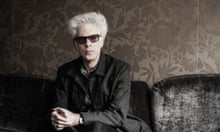

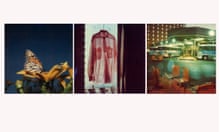


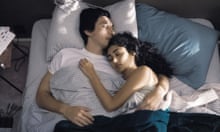
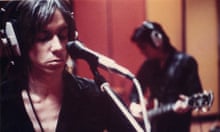



Comments (…)
Sign in or create your Guardian account to join the discussion